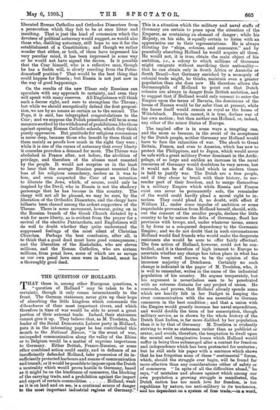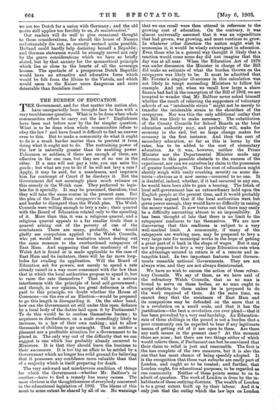THE QUESTION OF HOLLAND.
THAT there is, among other European questions, a " question of Holland " may be taken to be a certainty, though it only comes intermittently to the front. The German statesmen never give up their hope of absorbing the little kingdom which commands the de'bouchures of their most important rivers, and which therefore in time of war would be able to arrest a great portion of their external trade. Indeed, their statesmen cannot give it up. They believe that, as M. Troelstra, the leader of the Social Democratic Labour party in Holland, puts it in the interesting paper he has contributed this month to the National Review, "in the event of war, unimpeded communication along the valley of the Rhine or to Belgium would be a matter of supreme importance to Germany. Either British, Franco-Russian, or some other combined action could easily, and in defiance of an insufficiently defended Holland, take possession of its in- sufficiently protected harbours and means of communication and transit; or it would be possible to impose upon the Dutch a neutrality which would prove hostile to Germany, based as it might be on the hindrance of commerce, the blocking of the carrying trade, and a prohibition against the import and export of certain commodities Holland, weak as it is on land and on sea, is a continual source of danger to the most important industrial regions of Germany.", This is a situation which the military and naval staffs of Germany are certain to press upon the attention of the Emperor, as containing an element of danger ; while his Majesty, on his side, is equally certain to listen with an appreciative ear to their representations. He is always thirsting for " ships, colonies, and commerce," and by peacefully absorbing Holland he would acquire all three. He would not, it is true, obtain the main object of his ambition, i.e., a colony to which millions of Germans might emigrate without sacrificing their nationality— that he can obtain only in South Africa or Anatolia or South Brazil—but Germany enriched by a monopoly of colonial trade might, he thinks, maintain even a greater population than she does now He therefore allows the Germanophils of Holland to point out that Dutch colonies are always in danger from British ambition, and to suggest that if Holland would only consent to enter the Empire upon the terms of Bavaria, the dominions of the house of Nassau would be far safer than at present, while the house itself would remain as royal as the house of Wittelsbach. Bavaria cannot, it is true, declare war of her own motion ; but then neither can Holland, or, indeed, any other of the minor States of Europe.
The implied offer is in some ways a tempting one, and the more so because, in the event of its acceptance by the Dutch people, neither Germany nor Holland would have to face the calamities of war. The shock to Great Britain, France, and even to America, which has now to protect the Philippines, and to Japan, which would never be safe with a great military Power dominant in the Archi- pelago, of so large and sudden an increase in the naval resources of Germany would doubtless be very severe, but it would not be of the kind which in modern times is held to justify war. The Dutch are a free people, and if they chose to break with their history, to sur- render part of their freedom, and to merge themselves in a military Empire which while Russia and France exist can never be permanently safe, the remainder of the world could hardly plead a moral right to in- terfere. They could plead it, no doubt, with effect if William II., under some impulse of ambition or some improbable provocation from Holland herself, should, with- out the consent of the smaller people, declare the little country to be by nature the delta of Germany, flood her provinces with troops, and, under whatever terms, annex it by force as a conquered dependency to the Germanic Empire ; and we do not doubt that in such circumstances Holland would find friends who would make the desperate resistance she would be sure to offer fairly effectual. The free action of Holland, however, could not be con- trolled, and it is therefore of high interest to Europe to ascertain whether any change has taken place in what has hitherto been well known to be the opinion of the immense majority of Dutchmen. Certainly no such change is indicated in the paper of M. Troelstra, who, it is well to remember, writes in the name of the industrial population of his country. He argues temperately, but his argument is nevertheless seen to be penetrated with an extreme distaste for any project of union. He contends, and proves, that Holland already spends sums which are heavily felt in her Budget in keeping the river communication with the sea essential to German commerce in the best condition ; and that a union with the Empire would greatly increase her naval expenditure, and would double the term of her conscription, though military service, as is shown by the whole history of the Dutch East Indies, is far more disliked by her population than it is by that of Germany M. Troelstra is evidently striving to write as statesman rather than as publicist or orator, and avoids, therefore, the temptation to dwell upon the mental and imaginative losses which Holland would suffer in being thus submerged after a contest for freedom and independence which has been protracted for centuries ; but he still ends his paper with a sentence which shows that he has forgotten none of these " sentimental " forces, which, should the struggle ever begin, will be found far more effective than any considerations either of safety or of commerce. " In spite of all the difficulties ahead," he says," of mistakes and abuses against which among our own population a growing struggle is manifested, the Dutch nation has too much love for freedom, is too republican by nature, too anti-military in its tendencies, and too dependent on a system of free trade,—in a word, Our readers will do well to give occasional thought to these considerations, for should. the house of Nassau unfortunately die out, as recently seemed quite possible, Holland could hardly help declaring herself a Republic ; and German statesmen would be strongly moved not only by the grave considerations which we have so briefly stated, but by that anxiety for the monarchical principle which lies so close to the hearts of all the sovereign houses. The spectacle of a prosperous Dutch Republic would have an attractive and educative force which would be felt from the Rhine to the Vistula, and which would seem to the Kaiser more dangerous and more detestable than Socialism itself.











































 Previous page
Previous page